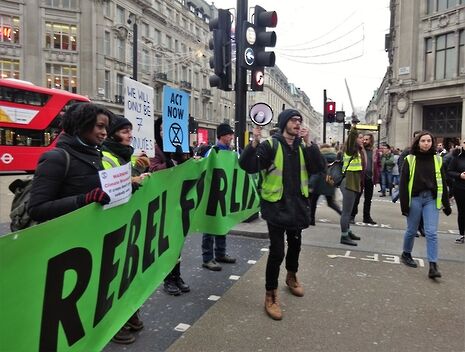We cannot lose Extinction Rebellion’s momentum
After a week with Extinction Rebellion, Tigs Louis-Puttick writes that though its rhetoric must be developed, it has proved that resistance can be powerful as well as peaceful

Arriving in London last week, I intended to pop by the Extinction Rebellion protest for a few hours. Yet after chatting to other ‘rebels’ on tree-lined, car-free, bee-populated Waterloo Bridge, I was compelled to stay longer. From kitchen volunteers, to arrestees, to media teams, everyone was contributing to create this beautiful, peaceful disruption. At one point, as waves of police advanced up Waterloo Bridge, I realised my time was no more valuable than anyone else’s. I joined the ‘arrestable’ people sat singing on the ground, and spent the next 12 hours in a cell.
Whilst my experience of arrest was emotionally charged yet largely positive, it is of utmost importance to recognise that this experience was a privilege I was afforded due to my identity as a middle class, white, English-speaking woman. Many are subject to entirely different, negative police encounters due to structural racist, anti-immigrant and classist sentiments which persist in Britain (and the world).
Returning to Waterloo Bridge 12 hours after my arrest, I found my bag exactly where I had left it, demonstrating the spirit of community and trust created by the Rebellion. Throughout the week, each occupied site became a space for sharing stories and ideas with complete strangers. We supported each other through feelings of responsibility and sadness alongside determination rebelliousness. From dancing in the road in Parliament Square at 4am as traffic lights changed, unheeded, to watching a woman in a wheelchair blockading Oxford Circus as lines of police advanced, this week was an unforgettable experience.
The Extinction Rebellion started in response to imminent climate disaster. In 12 years time, the 1.5•C global temperature increase will be irreversible. Sea levels and extinction rates are rising at unprecedented speed, and extreme weather events are devastating communities – particularly in the global South. Preferring to continue with ‘business as usual’, governments have been complacent and even denied that climate change exists. By burying its head in the safer sands of Brexit negotiations, the UK government refuses to prioritise the true emergency.
In light of this, XR demands for governments to: be truthful about climate change; produce legally binding policies to reduce carbon emissions to net 0 by 2025; and establish a national Citizen’s Assembly to oversee the changes. The demand for a 2025 zero-carbon target is ambitious – but not impossible. As Andrew Simms from the Rapid Transition Alliance commented, if we treated the climate crisis in the same way as economic crises, the results would be astonishing. It is easy to forget how powerful people working together can be, especially with both governments and corporations onside.
Non-violent public disruption has become one of the only options available. I regret that many people’s journeys through London have been disrupted this week, but such disruption is minor in comparison to the chaos of climate change. Why should a Londoner’s commute be prioritised over the lives of so many others?
“Non-violent public disruption has become one of the only options available”
With over 1000 arrests (making it the biggest recent act of civil disobedience), all action has remained non-violent. Continuous effort is being made to ensure the spirit of the movement is positive and painted with a beautiful wash of togetherness, dissolving political and social divisions and embodying true solidarity. ‘Tories for Climate Justice’ signs were waved side by side with Socialist banners, while I (a 20 year old Cambridge student from Plymouth) sat in a police van alongside a 75 year-old retiree from Scotland.
However, the arrest-based tactics of XR have alienated and marginalised people of colour, working class people and disabled people. Advocating – and glorifying – arrest as a tactic ignores historic and ongoing oppression at the hands of police which many people face. XR must reconsider their methods in order to become truly inclusive. Critical to this is decentralising the organisation to allow for the introduction of a wider variety of methods. I feel that such analysis has already begun this week. Speakers reminded us that XR non-violent direct action is a privileged experience far removed from the non-violent movements of MLK, Gandhi and Fawcett; people were invited to the stage to discuss their own international struggles; and working groups were set up by the People’s Assembly to tackle the barriers currently preventing inclusivity.
I respect people who have not participated in the protest due to institutional problems within XR. If the movement does not include and amplify the voices and concerns of the communities most affected, it cannot be truly rebellious. However, given the urgent nature of this crisis, XR’s powerful momentum cannot be lost, but its rhetoric and method must be developed.
So – has it been successful? The aims of disruption have been realised, with West End businesses reporting losses of £12m after only 2 days. At the same time, a study was conducted which found that the occupation had more support than opposition from the public. Passers-by gave everything from ‘thank yous’ to food as they walked past occupied sites. Musicians from Massive Attack and Nick Mulvey, to unknown gifted guitarists, helped energise the crowds, while appearances from Emma Thompson and Greta Thunberg increased public support and media coverage.
Of course, there were negative reactions too, but even if people don’t support the methods, discussion of climate change has exploded, with climate-related headlines splashed across the UK. We are waiting on MPs to respond. I hope they start enacting the changes we so desperately need.
The XR movement is far from perfect, and requires much work to ensure it goes from strength to strength as we head into an uncertain future. Personally, I have felt inspired, empowered and humbled by my experience of the Rebellion. Despite the underlying climate sadness which characterised the protest, it has proved that resistance can be powerful, yet also peaceful, uplifting and imbued with hope and joy.
As Greta Thunberg said to the thousands-strong crowd at Marble Arch, protesters will never stop fighting for this planet. I certainly don’t plan to, and if anything I feel this is really only the beginning.
 News / Uni Scout and Guide Club affirms trans inclusion 12 December 2025
News / Uni Scout and Guide Club affirms trans inclusion 12 December 2025 News / Cambridge Vet School gets lifeline year to stay accredited28 November 2025
News / Cambridge Vet School gets lifeline year to stay accredited28 November 2025 Science / Did your ex trip on King’s Parade? The science behind the ‘ick’12 December 2025
Science / Did your ex trip on King’s Parade? The science behind the ‘ick’12 December 2025 News / Pembroke to convert listed office building into accom9 December 2025
News / Pembroke to convert listed office building into accom9 December 2025 News / Cambridge study finds students learn better with notes than AI13 December 2025
News / Cambridge study finds students learn better with notes than AI13 December 2025








